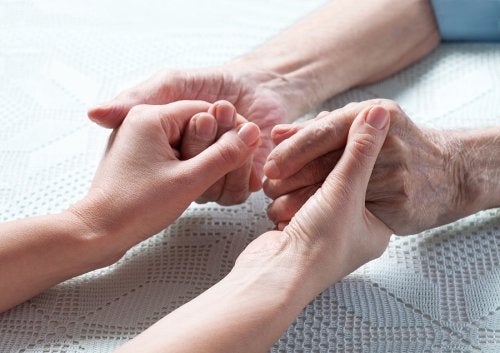-
Comfort for Caregivers During the Final Stages of Life
When a loved one is receiving hospice care in Memphis , it can be extremely difficult for family and friends to come to terms what is happening. It’s important to remember that end-of-life care is focused on your loved one’s comfort, so you can feel confident that he or she is not suffering. Part of hospice care is also caring for the family and friends of the person who is nearing the end of his or her life, so rely on the help that is available.
Remember to make time for yourself each day to focus on something that brings you pleasure, whether it is a coffee with a friend or simply watching television. Let the hospice provider meet the care needs of your loved one so you can focus exclusively on the time you have together. Don’t fall victim to isolation. Talk about your feelings to family and friends, and ask for help from the hospice caregiver when you need it. He or she can be a tremendous source of comfort, information, and support during this time.

-
A Step-by-Step Guide to Dementia Care
When a loved one is diagnosed with dementia, making a care plan is one of the most important first steps to take. Ultimately, depending on the type of dementia, your loved one may need occasional assisted living services, in-home care, and ultimately hospice in Memphis for his or her comfort and safety. Whether your loved one has Alzheimer’s disease or another form of dementia, here is a closer look at the steps involved in providing care.

In the early stages of dementia, your loved one may only need occasional help with things like cooking and cleaning that can become dangerous for someone with dementia. People with dementia that can benefit from assisted living services are usually have mild symptoms and are still able to provide most of their own care. Assisted living support from a home care aide can supplement the care provided by your family as much or as little as you prefer, in accordance with your schedule and your loved one’s needs.
Around-the-clock in-home care is the next step in most dementia care plans. This level of care becomes necessary when it is no longer safe for your loved one to be home alone. An in-home care aide can assist with meal preparation, cleaning, errands, medication reminders, and companionship. He or she can keep your loved one feeling safe and secure. Again, full-time in-home care schedules can be tailored to meet the specific needs of your family.
When your loved one is in need of end-of-life care, trained hospice care providers can support your entire family while ensuring your loved one is comfortable. Many people who get hospice care for a loved one are grateful for the support they received and the ability to be able to focus on spending time with their loved one at the end of his or her life. Hospice care providers can work with your loved one’s medical team to ensure that he or she has everything they need to be peaceful and comfortable.
-
What Seniors Need to Know About Heart Disease
Many seniors are living with heart disease, and it’s so important for them and those in charge of elder care in Memphis to be aware of the signs of complications, such as heart attacks. A few minutes can mean the difference between life and death when it comes to heart disease, so what this video to learn the signs you need to know.
Whether you’re a senior or a caregiver, know that most heart attacks don’t involve sudden, severe pain like they do on television. Instead, they start slowly, with chest pain that comes and goes, shortness of breath, and pain elsewhere in the upper body. If you provide elder care for someone with heart disease, these symptoms should be considered red flags that the person in your care needs emergency treatment. In-home care aides can save lives by being present and acting quickly when the person they are caring for has heart attack symptoms.
-
Planning for Recovery from Back Surgery
Back surgery is a serious procedure that typically involves a lengthy recovery. You or your loved one may spend a period of time in an in-patient treatment facility before transitioning to care at home. Having a plan for recovery that includes a plan for an in-home caregiver in Memphis and the appropriate assisted living services before the surgery is essential, so you can avoid being forced into making rushed decisions at a stressful time. If back surgery is on your schedule, here are some ways to plan for your recovery.

Get Recovery Supplies
After back surgery, it may be necessary to rely on medical devices, such as a walker, cane, toilet chair, and shower bars. Get these items before the procedure so they are set-up and ready to be used. The back surgeon will also provide prescriptions for pain medications and in some cases, antibiotics that can be filled before surgery. It is very important to stay on top of pain medication doses and refills, so that there is no risk of running out of the medications.
Make a Plan for Caregiving
Whether you or your loved one go straight home after surgery or spend time in a in-patient facility, it will be necessary to have in-home caregiving for an extended period of time. Decide how much care can be provided by family members, if any, and when you will need a home care aide to give assistance. Set up a schedule that includes the right mix of assisted living care provided by an in-home caregiver and care provided by loved ones.
Focus on Transition Care
The time in which patients leave the hospital and return home can be especially dangerous and demanding after back surgery. The risk of falling is high, and patients need assistance with everything from personal hygiene to transportation. Hiring a home care aide for transition care helps families feel confident that their loved ones always have the assistance they need during this crucial part of recovery.
-
Making Respite Care Part of Your Family’s Plan
When families have to come together to make decisions about elderly care for an aging loved one, there are several choices to make. Even if you wish to provide the bulk of the in-home care yourself, respite care is an important thing to include in your plan. No caregiver can provide care without a break and still provide the kind of support he or she wants to give a loved one. An in-home caregiver in Memphis can help you be the best caregiver you can by providing respite care.
Respite care is a short-term relief to caregivers that allows them to focus on their own well-being, while feeling confident that their loved ones needs are being met. An elder care provider can provide respite care so you can have a lunch with a friend, an afternoon on your own, or a vacation with your family. Respite care can also help you keep up work duties or even catch up on sleep. It is an important way of caring for your own wellbeing, so you can then care for your loved one.

-
Steps Seniors Can Take to Reduce Bone Fractures
Bone fractures are a significant health risk for seniors. Because many seniors suffer from bone loss, they are more vulnerable to fractures than ever before, and when fractures do occur, they can lead to prolonged loss of mobility, isolation, and depression. Fortunately, there are things that seniors and their caregivers in Memphis can do to reduce the risk of fractures and maintain their independence. Protect your bones or help an elderly love one keep his or her own bones safe with these steps.

Assess the Home
Sometimes, simply making changes around the home can drastically reduce the risk of fractures. Increase lighting in dim areas, such as adding nightlights to hallways or additional lamps in a dark room. Make sure that railings on stairs are secure and consider adding an additional rail so that there is one on each side. Remove trip hazards, like area rugs and cords, and add grab bars around the toilet and in the shower. These small changes can make a big difference in a senior’s risk of falling.
Consider Health
If you are a caregiver for an elderly loved one, consider how his or her health may impact his or her risk of bone fractures. For instance, poor eyesight can make your loved one more prone to falling and fracturing a bone, so ensure that your loved one has regular checkups. Some medications can cause dehydration, dizziness, and other side effects that can increase the risk of a fall that leads to a fracture.
Seek Help
Seniors don’t have to choose between risking a fracture by staying at home or moving into an outside facility. Elderly care providers can help with the things that seniors can no longer safely do, from cooking and cleaning to personal hygiene and running errands. By making sure your loved one doesn’t take unnecessary risks, you can help him or her stay in the comforts of home without the complications of a bone fracture.
-
Understanding What Happens at the End of Life
When a loved one needs hospice care in Memphis because he or she is approaching the end of life, there can be anxiety, particularly among family members, about what to expect. What this video for insight into what may happen at the end of life.
One researcher who has looked extensively into the dying process has found that most people receiving end of life care experience a sense of peace. Family members usually find that being present for end of life care and seeing a loved one pass is a moving experience that brings closeness and closure. Overall, hospice care and the end of life process can be an important time for family members to spend together, and most terminally ill people are peaceful, not fearful, of the process.
-
Requirements of Home Care for the Terminally Ill
When a terminally ill loved one needs care at home, whether he or she needs a caregiver while treatment is ongoing or it is time for hospice care in Memphis , there are unique needs that must be met. It is helpful to choose a caregiver with experience in home care for the terminally ill to ensure your loved one gets the necessary level of care and so you can reduce the pressure on yourself.
First and foremost, a terminally ill loved one may need practical care to assist with basic, everyday needs, such as hygiene and meal preparation. An in-home caregiver can offer this kind of support when you must be at work or when you need respite care. Your terminally ill loved one also needs care that is designed for his or her comfort and dignity. It is common for people to deal with a range of emotions while facing a terminal illness, and your loved one should never feel dismissed or like he or she is a burden to a caregiver. Hiring an experienced caregiver is the best way to make sure that a terminally ill loved one’s needs are being met.

-
What to Expect After a Hip Fracture
A hip fracture can be a painful and debilitating injury that requires a lengthy recovery. Generally, people can benefit from having an in-home caregiver to assist during their recoveries, when their mobility may be limited. Here is a look at what you can expect while you recover from a hip fracture and how in-home care in Memphis may be helpful.

Rehabilitation
After surgery to repair your hip fracture , you will undergo physical therapy during rehab in the hospital where you had your surgery or in a rehab facility. This physical therapy is designed to help you regain some basic mobility and begin to rebuild the muscles that will support your repaired hip. Usually, you will not be allowed to return home until you can confidently go up and down the stairs. You may be surprised how quickly you are out of bed and moving around, but this is actually an important part of your recovery. In most cases, patients can avoid complications associated with hip fracture surgery by walking as soon as possible.
Transition Care
When you return home from surgery, there are still many activities you won’t be able to do on your own. During this time, transition care provided by an in-home caregiver can be helpful, especially if your loved ones must work during the day. An in-home caregiver can help with everything from personal hygiene needs to cooking and light housework. A transitional caregiver can also be present to help you stick to the recovery plan recommended by your surgeon, including getting up and walking around at regular intervals. You won’t be able to sit for longer than 45 minutes without getting up and moving. A physical therapist may also come and visit you in your home during this time.
Return to Normal Activities
The rate at which patients can return to their normal activities varies. If you work an office job, you may return to work within six to eight weeks of surgery. You may not be able to return to physically demanding activities until three to six months after your procedure. Your surgeon will carefully monitor your recovery and advise you when you can resume your activities.
-
Communicating with a Loved One with Dementia
When a loved one has dementia, learning a new way to communicate with him or her can be difficult. Fortunately, with a little effort, you can still maintain a special connection with your loved one, even as his or her memory fails. Often, your in-home elder care provider can offer advice based on his or her experience working with people with dementia in Memphis . These tips will also help.

Set the Tone
You can have more productive communication with a loved one with dementia if you choose the right time and place. Make sure there are no distractions, such as TV or radio, when you begin a conversation. Sit close to your loved one and position yourself so that you are facing him or her directly. The lighting should be adequate so that your face can clearly be seen. Keep your body language relaxed, even if you feel nervous and frustrated. It is more useful to begin conversations when your loved one’s needs have been adequately satisfied, so ask his or her elder care provider when your loved one has last eaten and when he or she usually sleeps.
Keep it Simple
Dementia can make following multi-layered conversations difficult, so keep things simple to avoid frustration. Stick to one topic. It can even be helpful to choose a topic in advance and plan some of the things you would like to say. Your sentences should be short, and you should choose simple words. Don’t talk to your loved one as though he or she is a child. Address him or her in a normal tone of voice and be respectful. Dementia can be isolating, and your loved one may feel like he or she is no longer valued.
Be a Good Listener
Your loved one with dementia will still have many ideas he or she wants to express, so be sure to be a good listener. If you aren’t sure you have understood, repeat the point back to verify it. Pay close attention to your loved one’s body language. As dementia affects your loved one’s ability to speak, his or her body language will be a central part of how he or she communicates. Always let your loved one express his or her feelings without dismissing them.
